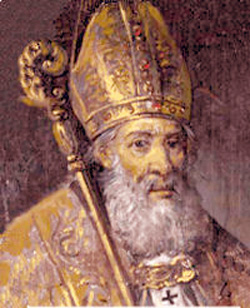St Eusebius of Vercelli, St Peter Faber SJ

St Eusebius of Vercelli
Bishop. Born in Sardina in the fourth century, to a Christian family who had suffered persecution for their faith, Eusebius grew up in Rome, became a priest there and was named bishop of Vercelli in Piedmont in 340. During the early years of his episcopate he lived with his priests in an organised community - possibly the first bishop to do so.
His troubles began when he refused to condemn the great theologian Athanasius, who stood up against the Arian heresy that claimed Jesus could not have been God and man. The Emperor Constantius banished him for refusing to sign a document condemning Athanasius. For the next six years Eusebius lived in exile in Palestine, Asia Minor and Egypt, suffering much ill-treatment from those in charge of him. On one occasion he went on a four day hunger strike in protest.
After his release in 361 he visited Alexandria and Antioch in an attempt to reconcile opposing groups there. He then returned to Italy where he joined St Hilary of Poitier in the fight against Arianism. His last years were spent peacefully and he died at Vercelli in 370.
Several of his letters survive. Many scholars think he helped to write the Athanasian Creed which had a great influence on Christianity for many centuries.
St Peter Faber SJ
Born in 1506 to a peasant family in the Upper Savoy region of France, Peter Faber met Ignatius Loyola in 1525 when he came to Paris to study and became became the first of his six companions.
Ignatius proved to be the perfect mentor for him, and Peter eventually became the master of the Spiritual Exercises. While hard on himself, Faber was gentle with others and became a gifted pastor of souls, winning others for Jesus.
Faber was sent to Germany in 1541, where he found the state of the Church in such disarray that it left his heart "tormented by a steady and intolerable pain." He worked for the renewal of the Church a person at a time, leading many in the Spiritual Exercises. Princes, prelates, and priests would especially find Peter Faber a gentle source of instruction and guidance leading to renewal.
Between 1544 and 1546, Peter Faber tirelessly continued his work in Portugal and Spain. Throughout all of his mission years in Germany, Spain, and Portugal, Faber traveled on foot. His final journey in 1546 was to Rome where, he was due to attend the Council of Trent. Exhausted from his labours, he died in St Ignatius's arms at the age of 40.
Pope Francis announced the canonization of Peter Faber on December 17, 2013 - the Pope's 77th birthday.
Pope Francis said he admired Peter for his "dialogue with all, even the most remote and even with his opponents. His simple piety, a certain naivety perhaps, his being available straightaway ; his careful interior discernment . the fact that he was a man capable of great and strong decisions but also capable of being so gentle and loving."
Read more about St Peter Faber here: https://anastpaul.com/2018/08/02/saint-of-the-day-2-august-st-peter-faber-s-j-1506-1546-the-second-jesuit/












